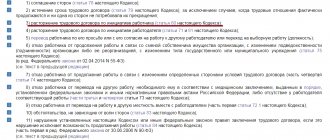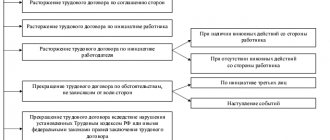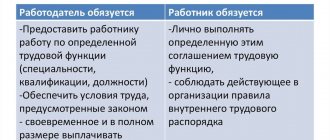Our country recognizes the special status of teaching workers in society and creates conditions for them to carry out professional activities. In the Labor Code of the Russian Federation, a separate chapter is devoted to the peculiarities of the work of teaching staff. The special status of teaching staff establishes not only special requirements for persons engaged in teaching activities, additional measures of social support for teachers, but also additional grounds for the dismissal of teaching staff and removal from work.
Reaching the age limit for filling the corresponding position
In accordance with Part 3 of Art. 336 of the Labor Code of the Russian Federation, the last additional reason for terminating an employment contract with a teaching worker is his reaching the age limit for filling the corresponding position. It should be noted that this norm refers us to Article 332 of the Labor Code of the Russian Federation, namely to its twelfth part. In accordance with which the age limit is established for filling certain positions in educational organizations of higher education. The age limit for holding a position is limited to 65 years of age and applies to the following employees:
- rector;
- vice-rector;
- branch manager.
Please note that reaching the age limit of 65 years is not always grounds for terminating an employment relationship. The Labor Code establishes that the founder of an educational organization has the right to extend the employment contract with the rector until he reaches the age of 70 years. A proposal to extend an employment contract is submitted by the academic council of a state or municipal educational organization of higher education (Part 13 of Article 332 of the Labor Code of the Russian Federation).
The rector, upon the recommendation of the academic council, has the right to extend the term of office of the vice-rector, head of the branch (institute) until they reach the age of 70 years.
To summarize, additional grounds for the dismissal of teaching staff are established in connection with the special status of workers and the specifics of their work activities. Established Art. 336 of the Labor Code of the Russian Federation, additional grounds for the dismissal of teaching staff are an exhaustive list.
Termination of an employment contract with teaching staff
General grounds for termination of an employment contract specified in Art. 77 of the Labor Code of the Russian Federation, as well as the grounds given in Art. Art. 81, 83, 84 of the Labor Code of the Russian Federation, in the presence of appropriate circumstances, may also be grounds for termination of employment contracts with teaching staff.
An employment contract with teaching staff, whose labor (official) responsibilities directly include educational functions, can be terminated on the basis provided for in clause 8, part 1, article 81 of the Labor Code of the Russian Federation - the commission by an employee performing educational functions of an immoral act incompatible with continuation of this work.
In addition to the grounds for termination of an employment contract provided for in Chapter 13 of the Labor Code of the Russian Federation, in relation to teaching staff of general education institutions, such grounds are:
Expert opinion
Polyakov Pyotr Borisovich
Lawyer with 6 years of experience. Specialization: civil law. More than 3 years of experience in drafting contracts.
1) repeated gross violation of the charter of an educational institution within one year (clause 1 of article 336 of the Labor Code of the Russian Federation, clause 1 of clause 4 of article 56 of the Law on Education);
This is important to know: Additional agreement to the employment contract: sample 2021
2) the use, including one-time use, of educational methods associated with physical and (or) mental violence against the personality of a student (clause 2 of Article 336 of the Labor Code of the Russian Federation, clause 2 of clause 4 of Article 56 of the Law on Education) .
The order (instruction) on termination of the employment contract, work record book and personal card indicate, as a basis for termination of the employment contract, a repeated violation of the Charter of the educational institution during the year and provide a reference to either clause 1 of Article 336 of the Labor Code of the Russian Federation, or to clause 1 of clause .4 Article 56 of the Law on Education. In this case, a reference to the Labor Code of the Russian Federation is preferable.
Termination of an employment contract is carried out in the manner established by Art. 84.1 Labor Code of the Russian Federation. On the last working day you need to:
- issue a work book to the employee. Upon receipt, the employee must sign in the Book of Movement of Work Books and their inserts, as well as in the personal card. If the employee is absent or refuses to receive a work book, the employer must send him a notice that he must appear for the work book or agree to have it sent by mail;
— pay the employee wages for the period worked and other amounts due to him, including compensation for unused vacation (if any).
Dismissal under clause 2 of Article 336 of the Labor Code of the Russian Federation is possible if the following methods are used (including one-time) by a teaching worker to students or pupils:
- physical violence, physical force, forced physical influence. A manifestation of physical violence can be beatings and any other actions that cause pain, forced deprivation of freedom, food, drink, etc.;
- mental violence. Manifestations of mental violence include threats, deliberate isolation, insults and humiliation, excessive demands, systematic unfounded criticism, etc.
Termination of an employment contract is carried out in the manner provided for in Art. 84.1 Labor Code of the Russian Federation. On the last working day you need to:
- issue a work book to the employee. Upon receipt, the employee must sign in the Book of Movement of Work Books and their inserts, as well as in the personal card. If the employee is absent or refuses to receive a work book, the employer must send him a notice that he must appear for the work book or agree to have it sent by mail;
— pay the employee wages for the period worked and other amounts due to him, including compensation for unused vacation (if any).
Additional reasons for dismissal of teachers
At the same time, the dismissal of teaching staff of secondary specialized educational institutions and educational institutions of higher professional education on the initiative of the administration, associated with staff reduction, is allowed only after the end of the academic year.
This is enshrined in paragraph 56 of the Model Regulations on an educational institution of secondary vocational education (secondary specialized educational institution), approved by Decree of the Government of the Russian Federation of July 18, 2008 No. 543. And also in paragraph 88 of the Model Regulations on an educational institution of higher vocational education (higher educational institution) , which was approved by Decree of the Government of the Russian Federation of February 14, 2008 No. 71. In addition to the general grounds for termination of an employment contract, Article 336 of the Labor Code of the Russian Federation in relation to teachers establishes additional grounds for termination of an employment contract.
https://www.youtube.com/watch?v=user0283oksana
Paragraph 1 of Article 336 of the Labor Code of the Russian Federation provides for such a reason for dismissal as repeated gross violation of the charter of an educational institution within one year. An employee can be dismissed on this basis if he has grossly violated the charter at least twice during the year. Moreover, for the first violation, a disciplinary sanction was already imposed on him under Article 192 of the Labor Code of the Russian Federation.
In this case, the period of one year begins to be calculated from the date of the first gross violation of the charter. It should be said that the legislation does not contain such a thing as a gross violation of the charter. Therefore, what is meant by this should be enshrined in the charter of the institution itself. If there is no such indication in the charter, then the head of the educational institution himself decides whether a specific violation of the charter is gross or not (taking into account the circumstances of the case).
Let us note that such dismissal, as stated in paragraph 52 of the resolution of the Plenum of the RF Armed Forces dated March 17, 2004 No. 2, is a disciplinary measure. Therefore, when dismissing on this basis, you must comply with all the rules for imposing a disciplinary sanction. Clause 2 of Article 55 of the Law of the Russian Federation of July 10, 1992
We invite you to read: Dismissal at the initiative of the employer in 2020
No. 3266-1 “On Education” provides for a disciplinary investigation into violations of the institution’s charter by a teaching employee. It can only be carried out based on a complaint received against it, submitted in writing. In this case, a copy of the complaint must be handed over to the teacher. Thus, upon dismissal under paragraph 1 of Article 336 of the Labor Code of the Russian Federation, if there is a complaint against an employee, the employer is obliged to conduct a disciplinary investigation to determine whether the employee is guilty of violating the charter.
The fact of a gross violation of the charter of an educational institution should be documented, for example, by reports and explanatory notes, complaints, acts, testimony of witnesses. Moreover, before dismissing a teacher, the employer must request a written explanation from him. If after two working days the employee does not provide the specified explanation, a corresponding report is drawn up.
So, the teacher’s failure to provide an explanation is not an obstacle to his dismissal. The employer’s order (instruction) on dismissal is given to the employee for review against signature within three working days from the date of publication, not counting the time the employee is absent from the institution. If he refuses to familiarize himself with the order (instruction), a corresponding act is drawn up about this.
Paragraph 2 of Article 336 of the Labor Code of the Russian Federation provides for such a reason for the dismissal of teaching staff as the use, including one-time use, of educational methods associated with physical and (or) mental violence against the personality of a student or pupil. Dismissal of an employee on this basis is possible in two cases.
- Use of physical violence methods. For example, beatings, bodily harm, torture, deprivation or restriction of freedom. As evidence of such actions by teachers, there may be bruises, bruises, or abrasions on the child.
- The use of educational methods associated with mental violence against the personality of the student or pupil. It can be expressed in insult, humiliation, threat, rude, neglectful treatment of children.
The facts of the use of physical and mental violence in this case can be confirmed by medical reports, witness testimony, and a psychologist’s opinion. Before dismissing an employee, it is advisable for the employer to request a written explanation from him, and if there are complaints, conduct a disciplinary investigation, since the use of violence by a teaching staff member of an educational institution is a violation of the norms professional behavior. Based on the results of the investigation, the employer evaluates the methods used by the teacher, on the basis of which he makes a decision to dismiss the employee.
The legality of dismissal on this basis may also be a court verdict in a criminal case against an employee on facts of violence.
We suggest you read: Termination of an employment contract, dismissal of an employee
Reaching the age limit for filling the corresponding position may also become a reason for dismissal (clause 3 of Article 336 of the Labor Code of the Russian Federation). Thus, in accordance with Article 332 of the Labor Code of the Russian Federation in state and municipal higher educational institutions, the positions of rector, vice-rectors, heads of branches (institutes) ) are replaced by persons not older than 65 years of age, regardless of the time of conclusion of employment contracts.
Persons holding these positions and who have reached the age of 65 are transferred, with their written consent, to other positions corresponding to their qualifications. Thus, before dismissal under paragraph 3 of Article 336 of the Labor Code of the Russian Federation, the employer must offer the employee other vacant positions, and only after his refusal from them or their absence, he has the right to dismiss the teacher on this basis.
There are no specific deadlines within which the employee must be offered other positions. But it seems that the employer can warn him about the upcoming dismissal and offer him another position in writing no later than two months before the employee reaches the age limit.
When dismissing on this basis, it is necessary to take into account that, upon the recommendation of the academic council of a state or municipal higher educational institution, the founder has the right to extend the rector’s tenure in his position until he reaches the age of 70 years. And the rector has the right to extend the term of office of the vice-rector, head of the branch (institute) until they reach the age of 70 years.
Paragraph 4 of Article 336 of the Labor Code of the Russian Federation provides for such grounds for dismissal as failure to be elected by competition to the position of a scientific and pedagogical worker or the expiration of the period for election by competition. According to Article 332 of the Labor Code of the Russian Federation, the conclusion of an employment contract to fill the position of a scientific and pedagogical worker in a higher educational institution , as well as transfer to the position of scientific and pedagogical worker, is preceded by election through a competition to fill the corresponding position.
We suggest you familiarize yourself with: Refusal of inheritance, types of deadlines and procedure for registration
https://www.youtube.com/watch?v=ytdevru
Moreover, these employment contracts can be concluded both for an indefinite period and for a period determined by the parties to the employment contract. A competition for filling the position of a scientific and pedagogical worker occupied by an employee with whom an employment contract has been concluded for an indefinite period is held once every five years.
If an employee holding the position of a scientific and pedagogical worker under an employment contract concluded for an indefinite period is not elected to the position based on the results of a competition or has not expressed a desire to participate in the said competition, then the employment contract with him is terminated. Thus, dismissal under paragraph 4 of Article 336 of the Labor Code of the Russian Federation is possible only in relation to scientific and pedagogical workers of universities.
The competitive selection for the position of scientific and pedagogical worker is announced by the rector (vice-rector, head of a branch) of the university in periodicals or other media at least two months before it takes place. This is enshrined in paragraph 3 of the Regulations on the procedure for filling positions of scientific and pedagogical workers in a higher educational institution of the Russian Federation, approved by order of the Ministry of Education of Russia dated November 26, 2002 No. 4114.






